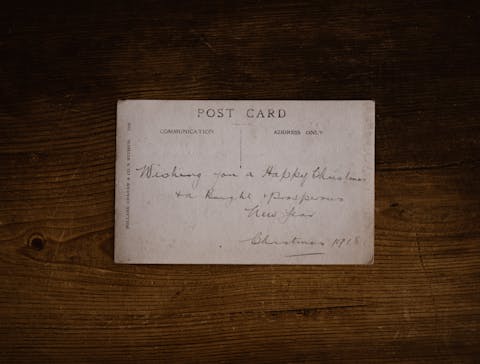How to Value Postcards
Postcards, while seemingly just everyday objects, or mundane pieces of stationary, are actually historical artifacts that have great value for many collectors.
Antique or vintage postcards provide a glimpse into another time, enabling us to observe places, people, fashion, and humor from the past. The simplicity and relatively inexpensive nature combined with the unique sense of fun and personability associated with postcards lends to an enthusiastic base of collectors across the whole globe. Do you have a postcard that you want to determine the value of or simply learn more about? Here are some helpful tips in endeavoring to do so.
History
Postcards are a relatively modern phenomenon, with the first series of commercial postcards being printed in the United States in 1893. It took some time for the concept to take off and become popularized, as many did not like the idea of sending out letters that could be read by anyone, however by the early decades of the 20th century they were an established form of lighthearted, fun communication. The often colorful, eye-catching images on the front of either illustrations or photographs were found to be charming and entertaining by many; it is no wonder that today we also find postcards to be such a pleasantly likable example of pop culture.
"Antique or vintage postcards provide a glimpse into another time, enabling us to observe places, people, fashion, and humor from the past."
Types of Cards
Collectors will typically focus on one out of two distinct subcategories of postcards, being either topographical, or subject cards. Topographical cards are more so focused on social history, featuring images of buildings, streets, cars, and people as they appeared in decades past. The more detailed the card is, the higher the value is. If the photograph is printed directly from the negative, it will be much more valuable compared to one that is printed off of a printing press.
A subject card, or ‘topical’, depicts a specific area of interest, for example, animals, glamour, children, ships, novelty, railway, and so on. As such cards are often illustrative, the artist of the image often plays a significant role in determining value. Art Nouveau and Art Deco cards by artists such as Raphael Kirchner, or Alphonse Mucha are extremely sought after.

Christmas Postcard, 1918
Condition
When assessing your postcard, one of the first things to take notice of is its condition. It goes without saying that a card will have a much higher value if it is in mint condition, and likewise the value will decrease if the postcard is damaged. Signs to look out for are whether or not the item is discolored, faded, torn, foxed, water damaged, crumpled, or compromised in any other way. Grades of condition follow a scale from poor, fair, good, very good, excellent, near mint, and mint; a postcard in mint condition will bring in top prices while one in poor condition may be worthless.
Age
Determining the age of a postcard can be difficult even if there is a date, as the postmark date only provides evidence as to when it was mailed, and many postcards were sold for years after the original printing. However the older your card is, the more valuable it will be. The oldest known picture postcard, posted in 1840, sold at auction for nearly £40,000 in 2002. Postcards that were printed before July 1 1898 are also very sought after and thus possess high value.
Postcards and Signatures
Other factors that play into evaluating a postcard’s worth are the individualizing aspects such as its postmark, or author. A postcard has the potential to provide important information about the card, including date and provenance. If the postmark itself is valuable, whether in its age, condition, or rarity, this can add additional value to your postcard. Likewise, if there is a handwritten message on your card from a significant historical figure, or regarding an important event in history, these can also increase the worth of the item.
Rarity, along with supply and demand, will likely be the ultimate factors in determining the worth of your postcard, as with any item. The rarer your card is, the more valuable it is likely to be, however this is not set in stone. If there is no demand for it on the market, it will likely not sell for much until and unless a motivated buyer emerges.
The Final Step
The last, and certainly the most important step to take in determining the value for your postcard collection is to seek professional appraisal. While the above hints are without a doubt helpful in leading one in the right direction, even the most meticulous and observant eye may be susceptible to error if untrained; thus the only way to be absolutely certain is to consult an expert. Luckily Value My Stuff provides professional appraisal and valuation so you can find out how much your postcards are worth today!

